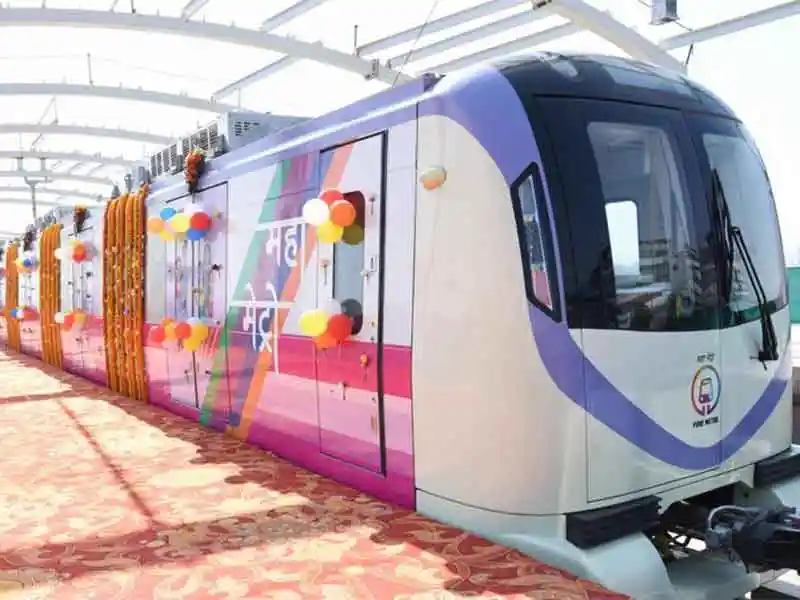Pune Metro Expansion: Phase 2 Approved, New Routes to Ease Traffic and Improve Connectivity
In a significant development for Pune's public transport, the Maharashtra government has given the green light to the second phase of the Pune Metro, a move that promises to drastically improve connectivity across key parts of the city. The new routes, spanning Khadakwasla to Kharadi via Swargate and Hadapsar, and Nal Stop to Manikbaug via Warje, will serve as major corridors, linking some of the most congested and rapidly developing areas of Pune. This expansion will bolster the city’s transport infrastructure, providing residents with faster and more efficient travel options, while also addressing severe traffic congestion on major roads.
First Phase Success and Future Extensions
The first phase of the Pune Metro is already operational, covering two key routes: Vanaz to Ramwadi and Pimpri Chinchwad to Swargate. This phase has been a game-changer in easing traffic woes for daily commuters and reducing travel time. While parts of these routes are still opening up in stages, the response from the public has been overwhelmingly positive. Work has also begun on extending these routes—Swargate to Katraj and Pimpri Chinchwad to Nigdi—which will further enhance connectivity in the northern and southern parts of the city.
In addition, plans to extend the Vanaz to Chandni Chowk and Ramwadi to Wagholi routes are in the pipeline, with proposals awaiting approval from the Union government. These extensions will ensure that crucial areas across Pune are linked, facilitating smoother and quicker commutes for residents and easing the burden on road traffic.
Phase 2: Connecting Pune's Key Corridors
With the approval of Phase 2, the Pune Metro will take a major leap forward in covering more areas of the city. The new Khadakwasla to Kharadi route, which will stretch over 25.5 km and feature 22 stations, is expected to significantly improve connectivity between western and eastern Pune. This route will traverse major hubs such as Swargate, Hadapsar, and Kharadi, all of which are known for heavy traffic, especially during peak hours. The total cost of this route is estimated at Rs 8,132 crore.
Additionally, the Nal Stop to Manikbaug route, spanning 6 km with six stations, will serve the central and western parts of Pune. The project, expected to cost Rs 1,765 crore, will link Karve Road and Sinhagad Road, which are crucial roads in Pune but are frequently plagued by traffic jams. According to authorities, the proposal is still subject to final approval from the Union government before implementation begins.
Union Minister of State for Cooperation and Civil Aviation, Murlidhar Mohol, emphasized the importance of these expansions, stating that the second phase will provide much-needed relief to Pune's traffic-ridden roads. "The state government’s approval of the new routes from Khadakwasla to Kharadi and Nal Stop to Manikbaug will offer residents faster, more reliable public transportation options and connect them to major parts of the city," Mohol said.
Metro to Ease Traffic and Improve Commuting
The new routes have been designed to address some of Pune's most severe traffic problems. Roads like Sinhagad Road, Solapur Road, and Karve Road frequently experience high congestion due to the volume of daily commuters. By introducing the metro system along these routes, the government aims to not only alleviate the traffic load but also provide an efficient and eco-friendly alternative to private vehicles.
Shravan Hardikar, Managing Director of Maha-Metro, noted that the metro routes will offer relief to commuters by reducing travel time and minimizing traffic congestion. "The metro will connect Sinhagad Road to Solapur Road and Nagar Road on one side and link to Karve Road and Satara Road on the other side, improving overall connectivity for residents," Hardikar said.
The Khadakwasla to Kharadi route, in particular, will create a seamless transit corridor for commuters from western Pune to the rapidly developing areas in the east, such as Hadapsar and Kharadi, home to a number of IT parks and business hubs. This route is expected to be a major draw for professionals and daily commuters who face long travel times due to heavy traffic.
Infrastructure and Future Growth
One of the highlights of this new expansion is the integration of the metro system with existing infrastructure. According to Madhuri Misal, BJP legislator, the ongoing work on the Sinhagad Road flyover is nearing completion, and provisions for the metro route above it have already been made. This ensures that the metro can be smoothly integrated into Pune’s existing road infrastructure, minimizing disruptions and ensuring a more efficient public transport system.
The expansion of the metro network also plays a crucial role in supporting Pune's urban growth. As one of Maharashtra’s major cities, Pune is witnessing rapid development, particularly in areas like Kharadi, Hadapsar, and Wagholi, where real estate and IT hubs are flourishing. By expanding the metro network, the government is investing in long-term infrastructure that will support the city’s continued growth and make daily commuting easier for residents.
The second phase of the Pune Metro represents a major step forward for the city’s public transportation system. By linking key residential, commercial, and industrial areas across Pune, the metro will offer a reliable, fast, and eco-friendly alternative to private vehicles, helping to reduce traffic congestion and pollution. The Khadakwasla to Kharadi and Nal Stop to Manikbaug routes will be game-changers for daily commuters, offering improved connectivity and faster travel times across some of Pune’s most congested roads.
With the completion of Phase 1 and the expansion of the metro network under Phase 2, Pune is well on its way to becoming a model for urban transport in India, providing residents with a modern, efficient, and sustainable public transportation system. The future of commuting in Pune is set to be faster, more convenient, and less dependent on road traffic, paving the way for a better quality of life for all residents.

COMMENTS (0)
Sign in to join the conversation
LOGIN TO COMMENT